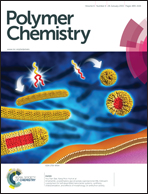Dual hydrophilic and salt responsive schizophrenic block copolymers – synthesis and study of self-assembly behavior†
Abstract
A new class of dual hydrophilic diblock copolymers (BCPs) possessing poly(ethylene glycol) (PEG) and zwitterionic polysulfabetaine (PSB) was synthesized by reversible addition–fragmentation chain transfer (RAFT) polymerization. These BCPs formed schizophrenic micelles undergoing core–shell transitions upon changing the medium from deionized water to an electrolyte solution. “Conventional” micelles, i.e. PSB at the core and PEG at the periphery, were formed in deionized water. The micelles “inverted” to form PSB at the shell and PEG at the core in electrolyte solutions. The reversal of core–shell structures was thoroughly studied by 1H-NMR spectroscopic analysis, dynamic light scattering (DLS) and transmission electron microscopic (TEM) techniques. Antifouling evaluation in the sea indicated that BCPs displayed antifouling behaviour to some extent. The dual hydrophilic BCPs reported here are potentially useful as stimuli responsive materials.


 Please wait while we load your content...
Please wait while we load your content...